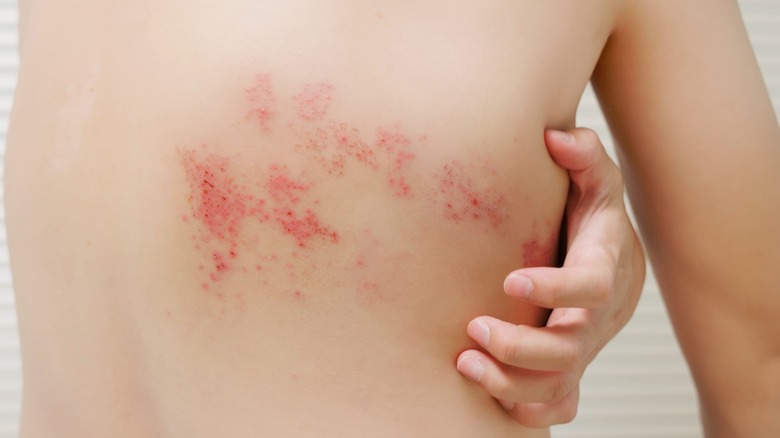Why The Shingles Vaccine Can Also Decrease Your Risk Of A Stroke
If you're like most Americans, you have a distinct memory of being sick at home with chickenpox, per the Mayo Clinic. There was the fever and headaches, oatmeal baths and calamine lotion for itchy skin, and trying to stomach chicken soup even though you didn't have an appetite. While the virus lasts for about a week, the effects of shingles may last a lifetime.
According to the CDC, about one in three adults will develop shingles. With 95% of American adults having contracted chickenpox in their life, the risk of getting shingles is extremely common. Once chickenpox leaves the body, the virus that causes it, herpes zoster, remains. It can later be reactivated, resulting in shingles, a painful, itchy rash that affects one side of the body.
Although the link between chickenpox and shingles is well-known, the link between shingles and strokes has been less clear. According to the American College of Cardiology, researchers found that shingles increased the risk for stroke by 35%, with the risk being higher for people with shingles who were under 40 years old. A new study now says that taking the shingles vaccine can decrease the risk of a stroke.
How the shingles vaccine can decrease the risk of a stroke
While scientists have noticed the link between shingles and strokes for some time, it has only been recently that they've been able to understand what the connection is. According to Novant Health, shingles causes inflammation and can increase blood clotting in the arteries. The risk of stroke can typically last up to one year after shingle symptoms occur.
The inflammation occurs in exosomes in the bloodstream, in which inflamed proteins inside of the exosomes make their way through the arteries, intensifying the risk of blood clotting, via Medical News Today. The study, which appeared in The Journal of Infectious Diseases, examined the blood of 13 people with shingles and found that there were large differences in the sample exosome makeup when the study was completed. The shingles vaccine decreases inflammation that is brought on by the herpes zoster virus, which in turn decreases the inflammation in the arteries that can cause strokes, via Cleveland HeartLab, Inc.
If you haven't had the shingles vaccine yet, talk to your doctor to see if it may be right for you.

